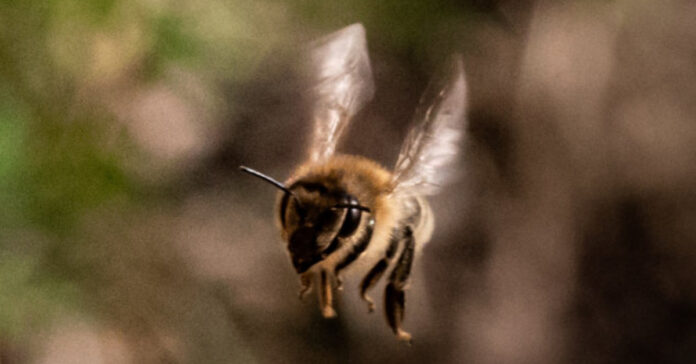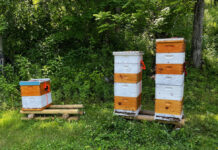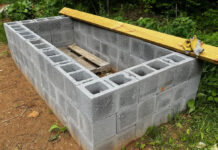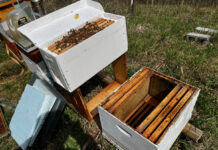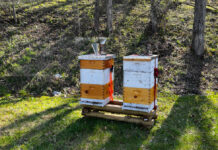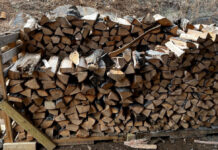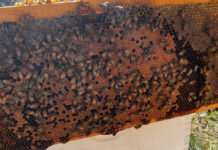In the middle of winter, I can read two or three books a week. I’ve been so busy lately I only had time to read two of the three books I checked out six weeks ago. I also have been leaving the homestead far more often, driving around for work, beekeeping, or my volunteer gigs. I kind of miss those weeks when I left the house only once a week.
In five out of the past eight days, I have been in my bee suit. Having an out yard means twice as much beekeeping, plus packing the truck and getting there and back. In addition to working in my bee yards, I have helped out in two other bee yards. This included helping a beekeeper in his late 80s who can no longer lift hives full of honey.
On Saturday, my wife helped out in our bee yard. She rarely does so because she is highly sensitive to bee stings and is not a big fan of bees. But we had 13 supers of honey to harvest, and it’s easier with two people. I took two stings for the team, but she got off untouched.
In case you are not aware, the super is a box of comb that sits above the beehive proper. A queen excluder keeps the queen “downstairs” where she lays eggs, but all the other bees can go “upstairs” and make honey. This allows us to harvest honey without eggs, larvae and pupae in it.
Harvesting Supers
There are two ways we harvest supers. The easiest is to use a leaf blower to blow the bees off the frames. Of course, as soon as the bees are blown off the frames, they try to jump back on, so we have to race to put the super on a board to seal the bees out and cover it with a lid.
The second way we harvest supers is best for supers that are not full of capped honey. In that case, we take an empty super and set it near the hive. Then we open a super on the hive, find a frame that has capped honey and shake the bees off it. If a few remain, we brush them off with a large turkey feather, which works better than the commercial brushes sold for the purpose. Then we slip the now bee-free fame into the new super while trying to keep the bees from getting back on it.
If a super has five or six frames of honey, we pull those in this manner, replace them with partially filled frames from another super, drawn comb, or foundation. This super then goes back on the hives so the bees can finish off the uncapped honey and make even more honey. This is the technique we used the most this spring because while almost all of our supers had honey in them, they were not all full.
After we have harvested the honey frames, we load the supers into the back of the pickup truck and carefully drive into the garage. Then we close the door and unload.
Angry Bees
Bees don’t like it when you take away the honey they have worked hard to prepare. They are also not thrilled at being blown, shaken, or brushed. When you harvest honey on a large hive, a cloud of angry bees will form. I wear protection for the tip of my toes to the top of my head, of course, including leather gloves. (I should have worn gauntlets because one bee crawled up your sleeve and stung me). Muck boots go up to my knees so the bees cannot fly up my pant leg, but I still got stung again when I took my hood off, thinking I was far enough away. Turns out the bees had chased me.
The day after we harvested honey, I was refilling the chicken’s water pails when an insect came out of nowhere and stung me on the head. I was using a hose, so I flushed it away with a blast of water. I can’t say for sure, but I think one of those angry bees ether smelled me or recognized me and got some revenge.
Last week, I proved that my growing resistance to bee stings applies to yellow jackets when I stumbled upon a nest of the sneaky bastards. I did the smart thing and ran. I felt lucky to escape with only two stings. The last time I uncovered a yellow jacket nest, three of them got me.
Yellow jackets are wasps, not bees, so I was pleased to find my resistance carried over. I admit I am curious if it will also carry over to hornet stings, spider bites, or snake venom. With any luck, I will never find out!
Extraction
We will extract and bottle the honey over the next few days, so expect a future report on our progress.

